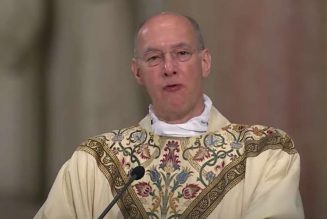When God commanded us to keep the seventh day holy and free from work, He expressed His knowledge of our nature, which we in the modern world rarely recognize. We are meant to rest, and we’re meant to enjoy our rest. If our pursuit of work and intensity is compromised because of our failure to rest, we are negating our own good and the good God desires of us.
For better or worse, I have been blessed with an abundance of energy and, more often than not, enthusiasm for the things I love. I love what I love, and I often ignore that which I don’t. But I really (yes, really) love what I love.
I caution “for better or worse,” though, because such energy can be frankly off-putting to those who do not share such enthusiasms. I have been criticized more than once in my life for “being over the top” and for letting my “interests cloud my judgments” and for putting “passion above intellect.” I had a professor in graduate school who threw a paper back at me with a C on it, stating, “You’re a beautiful writer; too bad you don’t have a mind to match it.” To be sure, he wasn’t the nicest professor, but the point stuck.
Let me offer a few personal examples. After a decade with The Imaginative Conservative, I have written well more than 1,000,000 words. I have three book contracts at the moment (one would be too easy—ha!), and I am at most times surrounded by my seven children, five cats, and one dog. Life piled upon life! Energy multiplied to the nth degree.
As I’ve aged, I’ve come to realize that I’ve kept myself so busy over most of my life that I feel I’m often just two steps ahead of the devil. If I slow down, he’ll get me. Theologically, I know this to not be true, but, at some other level, I worry it is.
But let me get to my point. We are meant to rest, and we’re meant to enjoy our rest. When God created time, space, the world, you, me, and everything under the sun (including the sun!), He rested on the seventh day. Genesis is well worth quoting here:
Thus the heavens and the earth were finished, and all the host of them. And on the seventh day God finished his work that he had done, and he rested on the seventh day from all his work that he had done. So God blessed the seventh day and made it holy, because on it God rested from all his work that he had done in creation.
While no commentary I can offer can do justice to the Word of God, it is worth emphasizing that God blessed the seventh day in a way He did not the other days. Somehow, the author of Genesis and the Author of creation recognized that one out of seven days must have its own flavor, its own character, its own soul.
Later, of course, we find the commandment to keep the seventh day holy and free from trials and corruption. As the tablets commanded:
Remember the sabbath day—keep it holy. Six days you may labor and do all your work, but the seventh day is a sabbath of the Lord your God. You shall not do any work, either you, your son or your daughter, your male or female slave, your work animal, or the resident alien within your gates. For in six days the Lord made the heavens and the earth, the sea and all that is in them; but on the seventh day he rested. That is why the Lord has blessed the sabbath day and made it holy.
Again, my words can add little to this, but it is quite clear that the Sabbath matters, and it matters intensely. In part (only in part, but an essential part, nonetheless), the human person must rest on the seventh day.
I might not be alone in this, but I have always found this commandment one of the more difficult ones to keep. Like most of us, I’m not really in danger of theft, or murder, or adultery. But not keeping the Sabbath is more difficult. After all, how many papers might get graded on such a day, or how about a quick run to the grocery store—after all, Sunday mornings are always quiet at grocery stores.
Then, of course, there’s the current situation of the social media world. From Twitter to Facebook, our social media—tied to our phones, our iPads, our laptops, and our smart watches—barrages us with images, with half-formed ideas, and with an endless stream of self-righteous and unreflecting anger. Where within 280 characters can we rest, can we think, can we contemplate?
The modern world wants and begs us to distraction, to keep our minds and our souls constantly agitated.
So, back to my wacky autobiography. I remember very few moments of rest in my childhood. Like most kids, I was not just active, but I was incredibly active, always on the move. I did love to read, but even reading became a kind of incessant activity, and reading led to research, and research led to constant movement from idea to idea, a sort of devouring. Between starting school (kindergarten) in 1973 and my first formal sabbatical in the 2008-2009 academic year, I’d taken no breaks. Indeed, one of my greatest regrets in life is that I went straight from college into graduate school, especially since I gave up the chance to do something of service, preferably (then) on an American Indian reservation or perhaps abroad in the Peace Corps.
Now for today. For the last two months, I have… finally… I think… rested. I’m still reading like a madman, and I’m still keeping up with most of my writing deadlines, but I’ve also picked up novels purely for enjoyment, I’ve tried (and mostly succeeded) to wean myself off Facebook and Twitter, and I’ve slept a lot (sometimes, 11 hours a night) and even for the first time in my life slept in. With my family, I have been on daily hikes, and—the dear Lord forgive me!—I’ve even watched some stupid movies… just for the fun of it.
Perhaps this doesn’t sound like much, but it’s been very good for my soul and my mental health.
When God commanded us to rest on the seventh day, to keep it free from work, to keep it holy, He expressed His knowledge of our nature which we in the modern world rarely recognize. Work and intensity are good—especially when for the good. But, as St. Paul tells us, we must always seek that which is beautiful and excellent. If our pursuit of work and intensity is compromised because of our failure to rest, we are negating our own good and the good God desires of us.
True beauty and excellence demand rest. They demand that we breathe and breathe deeply.
With the sabbath, God knew what He was doing. Should we be surprised?
The Imaginative Conservative applies the principle of appreciation to the discussion of culture and politics—we approach dialogue with magnanimity rather than with mere civility. Will you help us remain a refreshing oasis in the increasingly contentious arena of modern discourse? Please consider donating now.
The featured image is a detail from The Sabbath Eve by Alexander Johnston (1815–1891) and is in the public domain. It has been brightened for clarity and appears here, courtesy of Wikimedia Commons.










